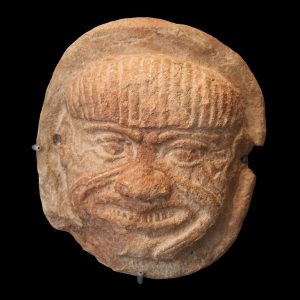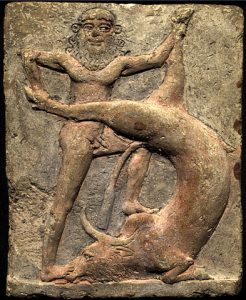Last week I indulged in one of my favorite activities: going to the cemetery at night to watch bats. I’m happy to report that the Little Brown Bat population in my corner of the world appears to be healthy.

I caught the end of the Perseid shower and saw a stunning meteor with a long tail just after dusk. A man named Kevin was there with his telescope and I saw the rings of Saturn and four moons of Jupiter. On this evening, Jupiter appeared brighter in the sky than Venus. It has to do with Jupiter being opposite the Sun right now.
I just finished a piece for Return to Mago for next month that will begin looking at defensive magic. In this context, I am interested in the Mesopotamian giant Huwawa and the story of how Gilgamesh and Enkidu killed him. The three appeared to me in a recent meditative journey. Huwawa looked like he does in the frescoes. Enkidu was thin and gray, in his death form.

Gilgamesh surprised me. There is a popular theory right now that the Sumerians were a black-skinned people, based on the name for themselves ,”the black-headed people.” Since the Sumerians also say that they came by boat from a land to the south, this is plausible. However, Gilgamesh looked as if he could be a typical man from present-day Iraq, only hairier and more buff. He had dark hair mixed with gray and a very long full beard. Only a little of his face showed in all that black-gray beard, and it was a good-natured face.

Mesopotamian culture was multi-ethnic, before and after the arrival of the Sumerians, so this appearance of Gilgamesh doesn’t really contradict the theory that the Sumerians came from an island off the coast of India. And Gilgamesh may have appeared to me in a later, Akkadian guise. I don’t think this was the first time I’d seen Gilgamesh either; only the first time that I recognized him.
I’m not sure how to feel about Gilgamesh. He does some bad things, some cowardly things, and some bone-headed things in his “epic,” and the narrative doesn’t attempt to put a positive spin on his actions. I think about him a lot, however, and I’m looking forward to writing about him and his adventures.
